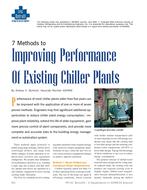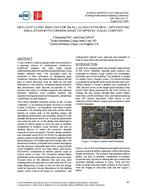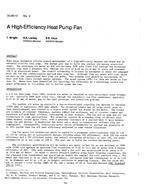Due to their intricate and unique control systems, recently developed variable capacity systems offer new challenges in quantifying system performance and efficiency. Traditional HVAC efficiency metrics and modeling strategies assume variable capacity systems operate in a fixed manner under a specific thermal load. However, variable capacity systems are designed to adapt to the thermal load based on user input and the unit’s settings. Understanding how variable capacity systems adapt as these parameters change is key in understanding the performance and efficiency of a given system. This paper examines performance characteristics of a variable capacity heat pump within a controlled laboratory setting. The residential split unit was operated by the standard unit controller within a two room thermal chamber. Results demonstrate the operation of the variable capacity unit under changing thermal load, user input, and internal settings.
Citation: ASHRAE Papers: 2015 ASHRAE Annual Conference, Chicago, IL
Product Details
- Published:
- 2015
- Number of Pages:
- 8
- File Size:
- 1 file , 1.7 MB
- Product Code(s):
- D-CH-15-C022


